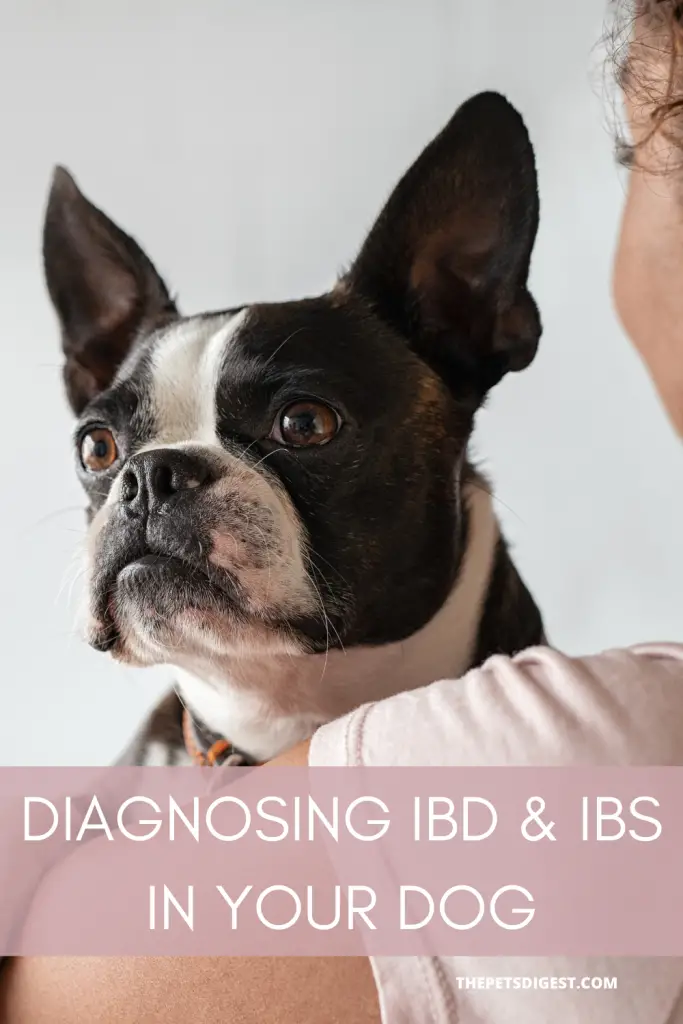Knowing the signs and symptoms to look for if you think your dog may suffer from IBS or IBD is crucial in keeping them healthy. Although Irritable Bowel Syndrome and Inflammatory Bowel Disease are similar they are two very different diseases. Many of the clinical signs presented are similar, but the treatment for IBD and IBS will vary.
As an owner of dogs with chronic gastrointestinal disorders, I understand the frustration that comes with them and the continuous search for a food that will not upset their stomachs but is also great tasting.
The fear of choosing the wrong foods and the frustration of not to be able to give in to those sad puppy eyes, as they stare up for a little more variety in their meals is taxing; but I understand the possible consequences of feeding the wrong things, as I’m sure you do too.
Two of the major gastrointestinal diseases in dogs are IBD and IBS, and while they have very similar names, they are in fact two quite different diseases. I talk about the differences between the two in my article what’s the big difference between IBS & IBD?
While the only way to get a true diagnosis for either disease is to see your veterinarian, these are some things you should look for at home if you suspect your dog may suffer from IBS or IBD
Diagnosing Inflammatory Bowel Disease

Inflammatory Bowel Disease (IBD) is a multifactorial disease characterized by chronic signs of illness that derive from inflammation of the gastrointestinal tract. It is usually the result of both environmental and microbial factors.
You are your pet’s first line of defense against the disease progressing, and observation is the biggest key to determining if you should take your pup to the vet for further workup. Watch for any clinical signs such as
- Vomiting (usually means the stomach is involved)
- Diarrhea (usually means the intestines are involved)
- Poor appetite
- Weight loss (which occurs in chronic cases)
How will your vet will diagnose IBD?
While you want to observe signs of IBD at home, it is quite difficult to give a definitive diagnosis without a full examination. When you take your dog in for further work up your vet will most likely run the following test.
Fecal examination
Your veterinarian will check your pups poop to rule out other possible causes of diarrhea like worms or baceteria. In addition, your dog may have some blood in their feces which is another common sign of IBD in dogs
Blood work
Most likely blood work will be taken to check your dogs white blood cell count and organ function. If your pet’s white blood cell count is elevated that coincides with inflammation
X-ray
Your vet will most likely want to get an x-ray with barium contrast to view the stomach and intestines.
Biopsy
This will conclusively diagnose the type of IBD you pup has, but is also the most invasieve as your dog will have to be placed under anetstesia. Vets often will put this further down the list than the more non-invasive procedures mentioned above.
How do you treat IBD?
No two dogs are alike, and what works for one dog (foods, medications, other therapies), many not work for your pup. In essences, treating IBD is a lot of trial and error.
Most pet owners will start with changing their feeding habits and destressing the environment. If you would like a more in-depth look at how to treat IBD in your dog read my article all about IBD in dogs.
In general you will want to
- Choose a limited ingredient diet, which eliminates many of the indigestible content of other foods
- Avoid highly processed foods
- Avoid foods that contain acritical colors, flavors, and additives
- If you discover grain to be a culprit of inflammation for your dog, you will want to cut it out of your dog’s diet
- Start your dog on pre-and probiotics, you can read more about that in this article that talks about four that I love
Diagnosing Irritable Bowel Syndrome?

IBS or Irritable bowel syndrome is any disturbance or irritation in the digestive system and can be caused by something as simple as stress! If you notice the following signs and there is no other cause for them, try to assess if your pet has been under any undue stress. Something as little as moving, or adding a new pet to the family can cause stress in some pets so pay attention to their reactions.
Some things to watch for are:
- Vomiting
- Loss of appetite with subsequent weight loss
- Diarrhea oftentimes with mucus
- Pain in the stomach
- Constipation
- Bloating
Your veterinarian may also want to do a biopsy as a definitive diagnosis if they are not able to rule out other causes of your dogs symptoms.
How do you treat IBS?
One of the major ways to treat IBS is to alleviate stress, but your vet will also want to look into what type of food you are feeding your dog and will most likely follow a similar protocol to treatment as with IBD. In addition, your pup may be placed on anti-anxiety medication to get your dog’s stress levels under control.
























































































































